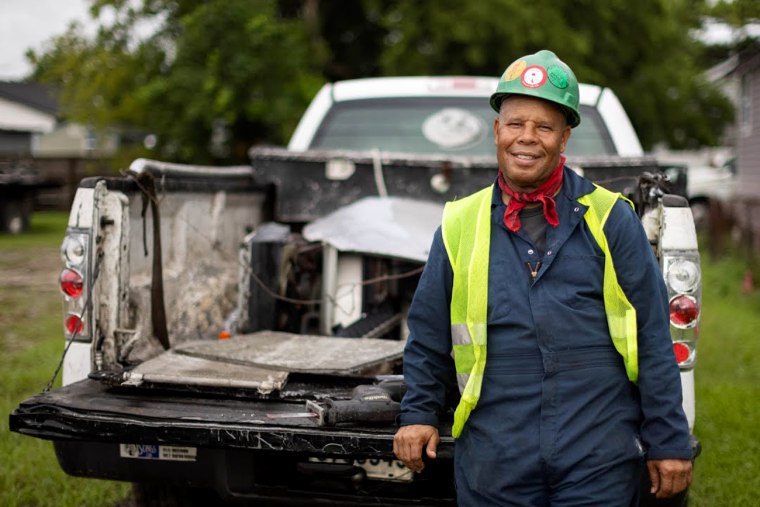Kermit Warren, an out-of-work shoeshine man from New Orleans, was carrying nearly $30,000 in cash through the airport in Columbus, Ohio, last November when federal drug agents stopped him and began asking questions.
Warren was returning home with his life savings after the purchase of a truck fell through. He had a one-way plane ticket, no luggage and he gave some shaky answers about himself and the cash, leading the agents to suspect that it was drug money.
Warren wasn’t charged with a crime, but the agents seized all of his cash.
With his savings gone and the Covid pandemic depriving him of steady work, the longtime church deacon barely scraped by. He said he wasn’t even able to buy his seven grandchildren Christmas gifts.
“This last year has truly been a nightmare for me,” said Warren, 58.
But this week, he received good news: federal prosecutors agreed to return all of his money and dismiss the case, according to a settlement agreement signed Thursday and obtained by NBC News.
“It gives me a great amount of joy and peace,” Warren said. “What happened to me should never happen to anybody in this world.”
Thousands of people are stopped and stripped of their money each year by U.S. law enforcement under a process known as civil asset forfeiture.
The controversial practice allows the government to seize people’s property – even without filing criminal charges – if it is suspected of being linked to criminal activity.
Supporters of civil forfeiture argue that it’s an essential law enforcement tool against drug traffickers, who are known to use cars and planes to ship large amounts of cash around the country. Critics say it’s routinely used against innocent people and disproportionately impacts people of color.
Challenging a civil forfeiture can be a long and costly affair, leading many to walk away from items such as cash and cars.
Warren won his case with the help of lawyers from the Virginia-based nonprofit Institute for Justice.
“We're relieved that Kermit is getting his money back, but we're also very upset that he was left destitute for an entire year for no good reason due to the callous, profit-driven actions of the DEA and the U.S. Attorney's Office for the Southern District of Ohio,” said Dan Alban, a senior attorney at the Institute for Justice.
“Kermit's case highlights how the federal government abuses civil forfeiture. It seizes cash on the flimsiest of pretexts – traveling with cash at an airport – and effectively forces people to prove their own innocence to get their money back.”
A spokeswoman for the U.S. Attorney's Office for the Southern District of Ohio confirmed the settlement agreement but provided no further comment. The DEA did not respond to a request for comment.
The Institute for Justice filed a class action suit against the DEA and Transportation Security Administration in January 2020, alleging that the agencies routinely violate airport travelers’ constitutional rights by confiscating their money without probable cause.
The plaintiffs in the suit include a Massachusetts woman who had more than $80,000 seized at the Pittsburgh airport as she was returning home with her parents’ savings to open a new bank account. The money was returned six months later, but the suit remains ongoing.
Over the past two decades, Kermit Warren stashed away whatever money he could from his jobs shining shoes, helping to make muffalleta sandwiches at the famed Central Grocery and cleaning his Lower Ninth Ward neighborhood for FEMA following Hurricane Katrina.
Warren lost his shoeshine job at the Roosevelt Hotel during the pandemic, prompting him to look for a tow truck to help him expand his side gig scrapping metal.
He thought he had found the perfect vehicle, but when he and his son arrived in Ohio to purchase the truck, he realized it was more suited to hauling large construction equipment.
When he and his son were back at the Columbus airport, a TSA screener spotted the cash but let Warren proceed. Shortly thereafter, DEA agents approached Warren and his son and began grilling them, court documents show.
Warren struggled to explain the source of the money, federal prosecutors said in court papers. Under questioning, Warren panicked and falsely claimed to be a retired police officer. He admitted soon after that he had misled them, according to the court documents.
Drug-sniffing dogs were called in, and they detected the presence of drugs on some of the money (A large percentage of currency in circulation is believed to contain drug residue).
Warren’s cash was seized, but he and his son were allowed to continue on their way without facing charges.
As is customary in civil forfeitures, prosecutors filed a civil complaint against the seized money. Warren challenged the seizure, and the case appeared headed for trial.
But prosecutors eventually backed down after Warren’s lawyers presented them with several pieces of exonerating evidence, including text messages with the owner of the truck and financial documents showing his income over the years.
In addition to returning all of the seized money – $28,180 – prosecutors agreed to dismiss the case against him with prejudice, meaning they cannot go after the money at a later date. As part of the deal, Warren agreed not to pursue legal action against the government.
It’s not clear when the funds will be returned to Warren, but prosecutors said that they will “make all best efforts” to do so by Thanksgiving.
For his part, Warren said the experience has convinced him to park his money in a bank and to never again travel with large sums of cash.
He said he now plans to focus on holding vocational bible classes at his church for young people interested in trucking careers.
“I want to start educating young men,” he said. “Not everybody is college material, but having a good trade under your belt, it goes a long way.”

